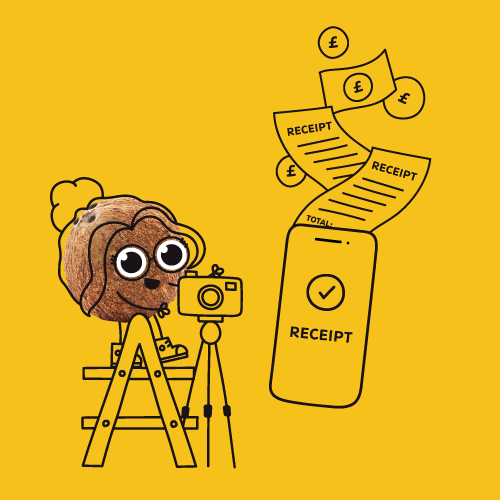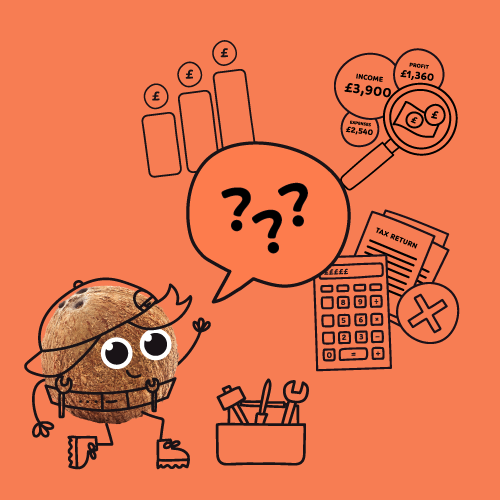As a sole trader, you will naturally have business-related costs on your books. Fortunately, you can declare a wide range of these in your tax return, the total of which will be deducted from your taxable profit—meaning that you get to keep more of your hard-earned cash.
Getting your expenses right in your Self Assessment is really important. It can be a lovely surprise to find out that things you've spent money on can actually provide you with some tax relief. But of course, there are rules that must be followed.
In the article below, we’ll run through what you can and can't expense when you're a sole trader.
Before we start...
If you're feeling uncertain about your finances, we strongly recommend you work with an accountant. Having an accountant is valuable beyond just compliance and tax planning—it’s about having someone by your side with the experience to help you make the big decisions and build a better business.
Coconut also makes it really easy for you to collaborate with your accountant. Once you've invited yours through the app, they'll be able to view your business activity and bookkeeping data whenever they need to.
Things you can expense as a sole trader
These are what HMRC calls 'allowable expenses'.
A good rule of thumb when claiming expenses is that you can only claim for those which are ‘wholly and exclusively’ incurred in the performance of your duties.
However, there are some important details and differences to note:
Accommodation
You can claim full tax relief on accommodation costs, such as an overnight hotel when travelling for business-related purposes.
Accountancy fees
You can claim any associated accountancy fees incurred for doing your tax return.
Bank charges
You’re able to claim for monthly fees or charges incurred.
Business mileage
If you use your personal vehicle for business travel to a temporary work location, you’re able to claim a mileage allowance (using HMRC’s business mileage rates)—but make sure you keep a mileage log to support this claim. You’re allowed to claim the full running costs of your vehicle (such as insurance, repairs and servicing) or you can just choose to claim the mileage rates for journeys you make.
Equipment and office furnishings
You can claim for your laptop, personal computer and office furniture, if these are necessary to carry out your business. Similarly, you can claim for any specialist software that you need to do your work.
Insurance
You can claim for the cost of insurance for your business, such as contents insurance for an office, professional indemnity insurance, or business equipment insurance.
Landline and broadband costs
If you’re using a home phone line/broadband for both business and personal calls, you can’t claim for line rental because they have a dual purpose. However, you may claim expenses for the business phone calls used on that line, provided they can be identified on the phone bill. Alternatively, and arguably less stressful, you could set up a separate phone line in your business name which is used 100% for business.
Legal and professional fees
Any legal or professional fees incurred while doing your job are claimable, as are professional subscriptions. So if you’re an actor, your Spotlight membership subscription is a taxable allowance, and if you’re a radiologist then so is membership to the Royal College of Radiologists.
Marketing, advertising, and PR
Those Facebook ads can be pricey, but the good news is you can claim tax relief on them—as well as other advertising, such as press releases and TV and radio ads.
Mobile phone
You can claim a reasonable portion of your mobile phone bill for business use (so if 30% of your bill is business-related, then you can claim that).
Office expenses
If you work out of an office, you can claim expenses for:
- Rent for business premises
- Business and water rates
- Utility bills
- Property insurance
- Security
- Repairs and maintenance
Specialist clothing
Those Jimmy Choos don’t count unless you’d lose your clients without them. But if you’re an actor, for example, you can claim on clothing used specifically for a role, or if you’re a dancer, your dance shoes are tax deductible.
Sub-contractors
If you use other freelancers, agencies or other suppliers to help you deliver your products or services, then you can claim these costs in full.
Subsistence (food and drink)
You can claim extra allowable costs for food and drink if you need to travel for your work: for example, paying for breakfast on your way to a meeting or job, or dining out if you’re staying overnight somewhere. That doesn’t mean you should go to the most expensive hot spot you can find though.
Training
If you’re doing some training that relates to your registered trade, then you can claim it. You can also claim the cost of upgrading existing skills that will support your future business income.
Travel
Travel is one of the trickier expenses to know whether or not you can claim. The general rule is that, if you're travelling for business to somewhere that isn't your usual place of work, and isn't a regular occurrence, you can claim the expense.
If you work from home, then generally you can claim any travel you do for work.
If the travel you do to clients is regular, i.e. at the same time in the same place each week, then that wouldn't be allowable. But if your visits aren't predictable, then you can claim.
If your work demands that you travel to a different location for each job, such as a plumber or mobile hairdresser, then you are what HMRC calls an 'itinerate worker'. You can claim all of your business travel.
Working from home
If you do all or most of your work from home, you can claim a flat-rate fee as an allowable expense or figure out what your actual costs were using a tool such as our Coconut Work from Home Allowance calculator.
Things you cannot expense as a sole trader
On the flip side, there are some things that you are not allowed to claim as an expense when you work for yourself.
Entertainment
In short, entertaining clients (even if it's all business, no pleasure) can't be claimed. This is a blanket rule that HMRC has, because it's hard to draw a line between business and pleasure when it comes to this type of expense. This applies to entertaining clients, prospects, third parties, and also yourself.
If you have employees, then staff entertainment is a separate concept, which you can claim for (within certain limits).
Wages
If you make regular payments to your personal account from your business account, you may call this your "wages". But, as you’re a sole trader, there's no distinction between you and your business. This means that paying yourself is effectively the same thing as moving money between your own accounts. As such, it isn’t counted as an expense, and doesn't impact your profit or tax calculation.
What receipts should I keep for my expenses?
In short, as many as you can. Credit and debit card receipts aren’t technically valid, because there’s no detail about what was purchased and no evidence that purchases are wholly and exclusively for your business. Moreover, if you’re registered for VAT, there’s no split on the VAT account.
The gold standard is to keep every single business receipt, just in case. What counts as a receipt is something that shows what was purchased, date, value and VAT if applicable. If cash is withdrawn, then receipts will be needed to account for each purchase.
Why do I need to keep receipts for my expenses?
If HMRC checks your tax return, they may ask for the documents to prove how much you spent on expenses. They can also charge you a penalty if your records are not "accurate, complete and readable".
How long do I need to keep my expense receipts?
For tax returns sent before the deadline, you should keep your records for at least 22 months after the end of the tax year the tax return is for. For tax returns sent after the deadline, you should keep them for at least 15 months after submission.
Safely scan and store receipts as you go
If you're tired or storing your receipts in a shoebox and sifting through them at the end of the tax year, then it's time to check out Coconut. Our app allows you to take photos of your receipts as you spend, and easily attach them to transactions. You can also jot down useful notes about each for you and your accountant (if you have one).
With Coconut in your pocket, there’s finally a home for your records, safely stored for when you need them.
Try Coconut for free










